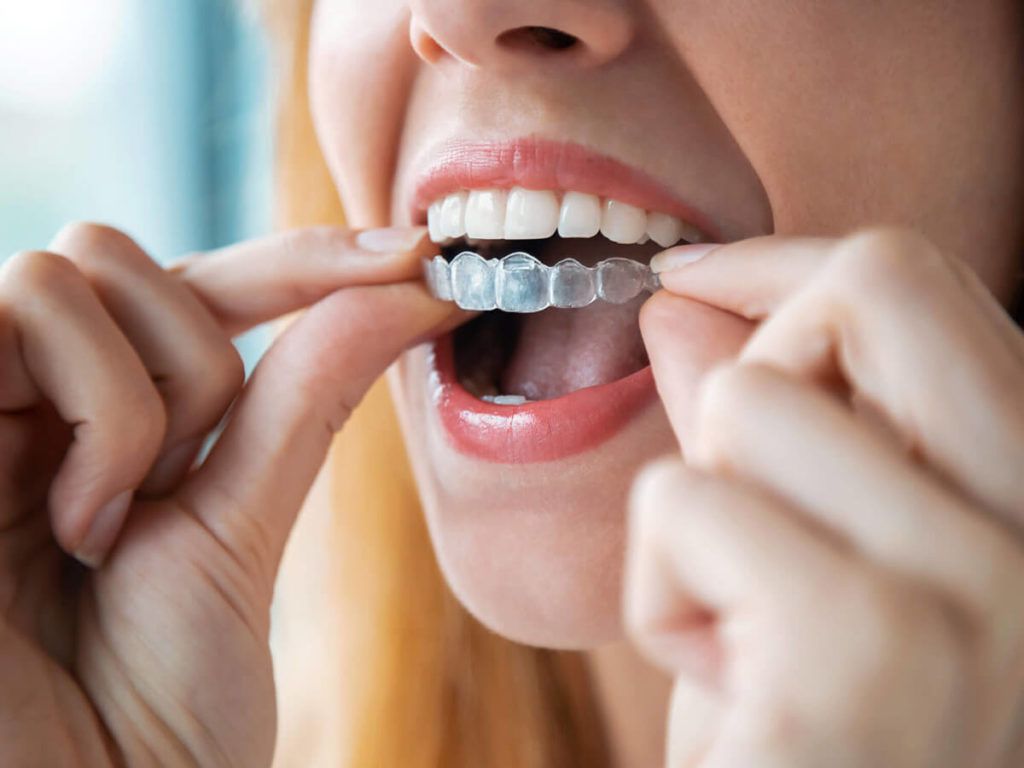Invisalign
Invisalign aligners prove that effective orthodontic treatment doesn’t have to be difficult. These ingenious appliances have helped millions straighten their teeth and achieve better-looking smiles, and they can help you too.
Invisalign Aligners
Invisalign aligners are an effective and discreet orthodontic treatment option that is worn comfortably over your teeth to continuously adjust alignment and spacing.
Invisalign aligners are custom-made using models of both your current teeth and the end result you hope to achieve. With Invisalign aligners, you will switch to new aligners about every two weeks with each set shifting the teeth slightly—this continues until you have achieved your final results, which usually takes about two years.
You remove the Invisalign aligners for eating, drinking, and cleaning only. At first, they will feel very tight, but they will begin to loosen and feel more comfortable after a few days.

-
How does the Invisalign process work?
To begin, we will take photographs of your teeth and face, dental impressions of your teeth, and x-rays. Those records are sent to Invisalign with detailed instructions on how we want the final result to appear. Invisalign will scan the impressions to create a 3D model of the teeth and work with your dentist to get the mold to its exact proportions. Once final, the trays are made and mailed to your dentist’s office. You will wear a set of trays for two weeks at a time for approximately 2 years, or the length of time determined by your dentist.
-
Invisalign vs. braces—what's the difference?
There are many differences between Invisalign aligners and braces, we’ve listed some of the largest ones here. Ultimately, the decision is up to you, but the introduction of clear aligners to the market introduced a more efficient, less painful way to straighten teeth.
- Materials. Invisalign aligners use clear transparent plastic, while braces use wires and brackets.
- Removability. Invisalign aligners can be removed by the user at any time, while braces can only be removed by a professional.
- Food Restrictions. Invisalign allows a user to eat whatever they would like and not make changes to their oral care practices, while braces restrict what the user can safely eat and require special maintenance and care.
- Injury Risks. Invisalign aligners do not present any injury risks, while braces can lead to cuts and other injuries.
- Visibility. Invisalign aligners are nearly impossible for others to notice, while braces are almost impossible to miss.
-
How much does Invisalign cost?
The cost of this treatment is similar to the cost of metal braces. Costs can vary, depending on:
- Insurance coverage. Most insurance plans cover Invisalign aligners the same way they cover metal braces. It is rare that insurance will cover Invisalign aligners for purely cosmetic reasons, but each case is different.
- Length/complexity of treatment. With Invisalign, you get new clear aligners every couple of weeks, so the cost varies, depending on if your treatment requires more (or fewer) aligners.
If you have any financial questions, please contact our office and we will be happy to discuss your insurance coverage or additional payment options available.
Contact Platte Valley Dental Group -
Who can use Invisalign?
Most teens and adult patients requiring mild to moderate orthodontic corrections can use Invisalign. This includes patients with teeth that are crooked and misaligned or teeth that feature noticeable spacing problems. Invisalign can even help patients with minor bite issues—however, not all orthodontic issues can be treated with Invisalign. More extensive problems will require additional treatment.
Interested in Invisalign?
If you would like to setup an Invisalign consultation, if you have any questions about how clear aligners work, or if you're unsure if Invisalign aligners are right for you—contact us.

